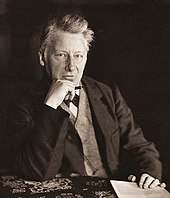Nobel Prize in Chemistry
The Nobel Prize in Chemistry (also Nobel Prize in Chemistry ) is one of five of Alfred Nobel instituted the Nobel Prizes , the "which may be assigned to humanity have conferred the greatest benefit to [...]." In order founded in 1900 Nobel Foundation it is every year awarded by the Royal Swedish Academy of Sciences and has been endowed with nine million Swedish kronor (around 878,000 euros) since 2017 .
After the announcement of the award winner at the beginning of October (traditionally the day after the announcement of the physics award winner of the year), the award ceremony will take place by the Swedish king on December 10, the anniversary of the death of the award sponsor.
Selection process
Like the other Nobel Prizes, the prize goes back to Alfred Nobel's will:
"Kapitalet av utredningsmännen realiseradt till säkra värdepapper skall utgöra en fond, hvars ränta årligen utdelas som prisbelöning at the som under det förlupna året hafva gjort menskligheten den största nytta. Räntan delas i fem lika delar som tillfalla: […] en del den som har gjort den vigtigaste kemiska upptäckt eller förbättring […] Prisen för fysik och kemi utdelas av Svenska Vetenskapsakademien […] Det är min uttryckliga vilästeln attseende prisende vid någon slags nationstillhörighet sålunda att the värdigaste recipient priset antingen han är scandinav eller ej. ”
“The capital that has been turned into safe securities by the estate administrators is to form a fund, the interest of which is to be distributed annually as a prize to those who have brought the greatest benefit to mankind in the past year. The interest is divided into five equal parts: […] a part for whoever has made the most important chemical discovery or improvement […] The prizes for physics and chemistry are awarded by the Swedish Academy of Science […] It is my express will that the award is not tied to any nationality, so that the most worthy receives the award, whether he is Scandinavian or not. "
The Nobel Foundation, which was set up specifically for this purpose, is responsible for organizing the award ceremony.
Candidates can be nominated by previous Nobel Prize winners, members of the Royal Swedish Academy of Sciences and selected university professionals. In September of the previous year of the award ceremony, the committee asks the eligible persons for suggestions, which must reach the Nobel Committee by January 31st.
The achievements of the more than 250 proposed scientists each year are then assessed by independent experts. Based on these evaluations, the committee makes a pre-selection and sends a report signed by all members to the Royal Swedish Academy, which is discussed in two meetings by their chemistry class . At the beginning of October, the academy finally votes on the proposals in a meeting and announces the result in a press conference.
In principle, only the winner is announced; the names of the other candidates as well as information about the entire selection process are subject to a 50-year blocking period.
Award ceremony
The winners, along with the winners of physics, medicine, literature and economics, will be invited to Stockholm , where the Swedish King will present the Nobel Prizes on December 10, the anniversary of Nobel's death. In addition to a Nobel medal and a personal diploma, the winner of the Nobel Prize in Chemistry will receive prize money of eight million Swedish kronor (around 780,000 euros). If the prize is awarded to more than one person (up to three are possible according to the statutes of the Nobel Foundation), this sum is distributed among the winners, the exact proportions being determined by the committee.
Award winners

The Nobel Prize in Chemistry has so far been awarded to 181 people (as of 2021) .
- The first laureate in 1901 was Jacobus Henricus van 't Hoff from the Netherlands .
- In addition to Marie Curie, six other women received the Nobel Prize in Chemistry: in 1935 their daughter Irène Joliot-Curie (together with her husband Frédéric Joliot-Curie ), in 1964 the British Dorothy Hodgkin , in 2009 the Israeli Ada Yonath , in 2018 the American Frances H. Arnold , in 2020 the French Emmanuelle Charpentier and the American Jennifer Doudna .
- The only two-time winner was Frederick Sanger . He was the sole recipient of the prize in 1958 and was awarded the Nobel Prize in Chemistry a second time in 1980, this time together with Paul Berg , who received half of the prize, and Walter Gilbert .
- Two other winners also received a Nobel Prize in another category:
- The 1911 laureate, Marie Curie , had already been awarded the Nobel Prize in Physics in 1903.
- Linus Carl Pauling was a 1954 laureate and was also awarded the Nobel Peace Prize in 1962 for his work against nuclear weapons .
- Roger D. Kornberg , the 2006 laureate, is Arthur Kornberg's son , who, together with Severo Ochoa, was awarded the 1959 Nobel Prize in Physiology or Medicine .
- There was 63 times a single award winner, 25 times two and 24 times three people shared the award (as of 2021).
Web links
- The Nobel Prize in Chemistry (nobelprize.org)
- Royal Academy of Science
Individual evidence
- ↑ Extract from the will ; The original “in the past year” has been left out, as it is relativized in § 2 of the statutes of the Nobel Foundation .
- ↑ Guido Valentin: Det hände 1897 . AWAY. Bokverk, Stockholm 1943.

